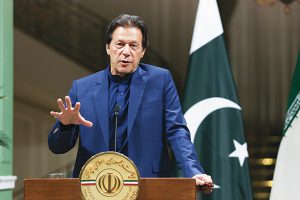Bloomberg
To avoid losing a no-confidence vote in parliament, Pakistan leader Imran Khan instead triggered an unprecedented political crisis. Now the question is whether voters will reward him at the next election.
In a series of events that stunned Pakistan, a member of Khan’s party scrapped the parliamentary vote over alleged foreign interference before the prime minister swiftly called an election in a nationally televised address. The president, another Khan ally, dissolved parliament shortly afterward.
The opposition was livid. Shehbaz Sharif, who was set to take power after the vote, said Khan should be charged with treason since the constitution forbids the dissolution of parliament during a no-confidence debate.
Even Khan’s deputy attorney general resigned, calling the moves “illegal†and
saying the former cricket star “made a mockery of the constitution.â€
Now Pakistan’s Supreme Court will decide whether Khan gets his wish for an election, or whether the
no-confidence vote should proceed.
A three-judge panel said it would review arguments. But no matter what they eventually decide, Pakistan needs to hold a national vote by August 2023 — and Khan is betting the drama will help him return to power.
The president said Khan will continue as prime
minister until a caretaker is appointed.
“It’s a move to try and survive,†said James Dorsey, a senior fellow at the S Rajaratnam School of International Studies in Singapore. “Clearly he feels comfortable that he can win another election.â€
Khan’s maneuvering is about more than just his own political future: It also has geopolitical implications.
 The Gulf Time Newspaper One of the finest business newspapers in the UAE brought to you by our professional writers and editors.
The Gulf Time Newspaper One of the finest business newspapers in the UAE brought to you by our professional writers and editors.
